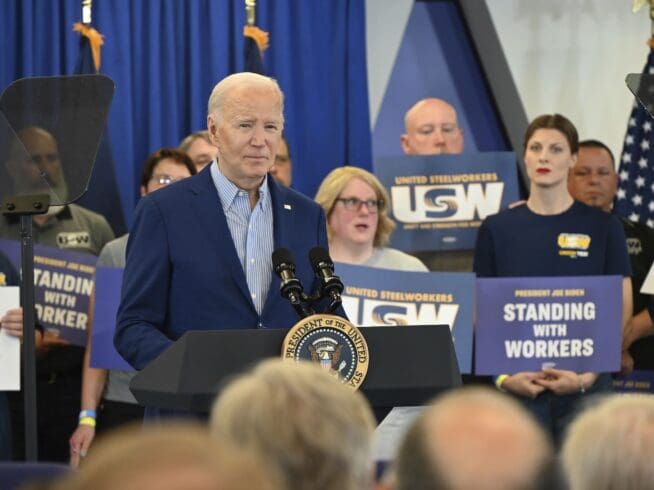Michigan Republicans’ bills push right-wing social policies, not lower consumer costs
Michigan’s six GOP U.S. House members have filed more than 70 bills, but few would address the party’s promised priorities.
Throughout the 2022 midterm congressional campaign, Republicans running for seats in the U.S. House of Representatives promised to focus their attention on improving the economy, preserving individual rights, boosting government accountability, and making communities safer.
According to Congress.gov, Michigan’s Republican delegation has filed a total of 71 bills in 2023. Just one has become law: Rep. Jack Bergman’s bill to rename a Department of Veterans Affairs clinic in Indian River, Michigan.
Since winning a narrow majority in November, the GOP caucus and its six members from Michigan have instead focused on a right-wing social agenda that has little to do with helping to improve their constituents’ everyday lives.
A review of bills introduced in the House since January indicates that few would impact any of the stated priority areas.
Last September, House Minority Leader Kevin McCarthy (R-CA) and his caucus announced their “Commitment to America” for what Republicans would do should they win a majority. The plan’s preamble stated: “Starting Day One, we will work to deliver an economy that’s strong, a nation that’s safe, a future that’s built on freedom, and a government that’s accountable.”
Michigan’s Republicans tweeted out their endorsements of the agenda.
“President Biden and Speaker Pelosi have made people’s lives more expensive and communities less safe,” said Rep. Tim Walberg. “The Commitment to America is all about getting our country back on track.”
“Under Democrat control, Washington has lost its focus. The Commitment to America is a plan for a new direction that embraces freedom and opportunity to build a better future for #WestMichigan and our nation!” said Rep. Bill Huizenga.
Rep. John Moolenaar said: “The past two years have revealed that the Democrats don’t have the answers. Remember the answer Republicans have – The Commitment to America. We will work to implement these solutions when we take back the House.”
On Jan. 3, the House convened with a narrow five-seat GOP majority. House Speaker McCarthy and Majority Leader Steve Scalise (R-LA) have struggled to advance a legislative agenda over their first eight months in those positions.
Just 11 bills have become law during that time. One was a bipartisan compromise to address the debt limit and reduce federal spending levels. The others were mostly minor, such as a proposal to mint a commemorative coin for the Marine Corps’ 250th anniversary.
The bills would do little to reduce consumer costs, keep citizens safe from gun violence, or ensure Michiganders’ individual liberties.
Bergman’s 11 other bills include one to grant special anti-discrimination protections to arms and ammunition companies who apply for federal contracts. Another would make it harder for the executive branch to protect health, safety, and the environment by requiring individual approval by Congress of any federal regulation that “may impose an annual cost on the economy of at least $1 billion.”
Of Huizenga’s 10 bills, several take aim at consumer protections, corporate transparency, and socially responsible businesses. Two would roll back disclosure requirements for corporations if the information in question is not deemed “material” for shareholders to know. One would bar asset managers from voting for environmental, social, and governance (ESG) initiatives of the companies they hold in their index funds unless they get express permission from each of their investors. Another, dubbed the “Stop Trying to Obsessively Vilify Energy Act,” would effectively prohibit safety regulations on gas-powered stoves, cooktops, ranges, or ovens in the United States.
Rep. John James has filed nine bills. One would eliminate any tax credits for clean energy vehicles if their battery components are partially made in China, Russia, North Korea, or Iran, or are made by a company at least 20%-owned by a company backed by one of those nations.
Moolenaar’s seven bills would permanently fund school vouchers for students to attend private and religious schools in Washington, D.C., would exempt Native American tribes from federal labor protections, and would convert federal education funding to unregulated block grants to states.
The 12 bills Rep. Lisa McClain has introduced include one to block student loan debt relief and one that would prohibit research on tissue taken from aborted fetuses.
Walberg’s 21 bills are heavily focused on undermining protections for workers, the climate, and LGBTQ+ individuals. One would require schools to out transgender students to their parents if they request to be addressed by a different name or gender pronouns; one would give college clubs special protections to discriminate if they cite religious reasons; one would let companies ignore any local environmental or historic preservation rules if they build communications facilities on polluted properties known as brownfields; one would block car pollution emissions standards; and one would change the composition of the National Labor Relations Board to give Republicans the power to veto all decisions, even when a Democratic administration is in office.
Tommy Kubitschek, a spokesperson for the Michigan Democratic Party, told the American Independent Foundation:
Michigan Republicans are constantly putting their MAGA agenda ahead of the needs of Michiganders. While Democrats from Lansing to Washington are delivering on their promises and working to grow the middle class, the GOP is pursuing radical policies and ignoring their constituents. The difference between the two parties could not be more clear in the coming cycle.
Published with permission of The American Independent Foundation.




